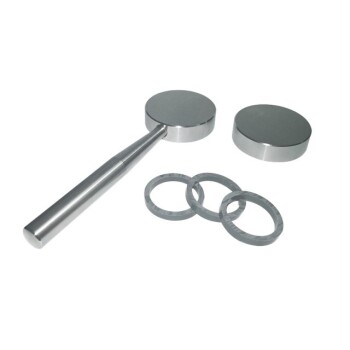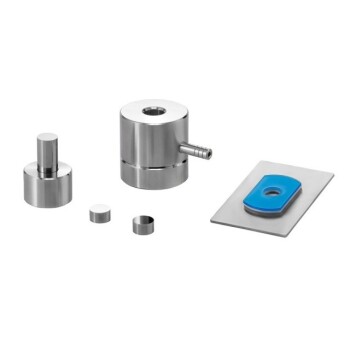At its core, the difference between a benchtop press and a hydraulic mini press lies in specificity versus generality. "Benchtop press" is a broad category of equipment defined by its form factor—small enough to fit on a workbench. A "hydraulic mini press" is a very specific type of manual benchtop press, optimized for a narrow range of tasks like preparing KBr discs for spectroscopy.
The key distinction is that "benchtop press" describes a versatile category based on size, while "hydraulic mini press" describes a specialized tool within that category, defined by its manual hydraulic mechanism and specific application. Think of it as the difference between a general-purpose toolkit and a specialized wrench.

Defining the Core Categories
To choose the right instrument, you must first understand that these terms are not mutually exclusive but describe a hierarchy. One is a broad class of equipment, and the other is a specialized member of that class.
What Is a Benchtop Press?
A benchtop press is any press designed to be operated on a laboratory workbench. This classification is based on its size and location of use.
These presses are valued for being space-efficient and durable. Because "benchtop" is a general descriptor, they can encompass various power mechanisms, including manual, pneumatic, electric, or hydraulic systems.
They serve a wide array of applications in materials science, geology, and polymer research, handling diverse sample types and sizes.
What Is a Hydraulic Mini Press?
A hydraulic mini press is a specific subtype of manual benchtop press. It is defined by its mechanism and intended purpose.
These presses are characteristically compact, lightweight (often around 4 kg), and portable. They use a manual hydraulic system to generate force, typically around 2 tons.
Their primary and most common application is the creation of small (e.g., 7mm) potassium bromide (KBr) discs for FTIR (Fourier-transform infrared) spectroscopic analysis.
Key Differentiators at a Glance
Comparing these presses reveals fundamental differences in their operational scope, power, and ideal use cases.
Power Source and Operation
A hydraulic mini press is almost always manually operated. An operator uses a lever or handle to build hydraulic pressure, which is monitored on an integrated gauge.
A general benchtop press, however, is not necessarily manual. It can be automated or powered by electric motors or pneumatic systems, offering more control and repeatability for complex tasks.
Application and Versatility
The hydraulic mini press is a specialist tool. It excels at producing consistent KBr discs for FTIR analysis and similar small-scale pelletizing tasks.
A benchtop press is a general-purpose instrument. Its versatility makes it suitable for a much broader range of applications, including sample preparation, destructive testing, and materials compaction across various research fields.
Portability and Footprint
Portability is a defining feature of the mini press. Its small size and low weight make it easy to move between labs or store when not in use, which is ideal for environments with limited space.
While all benchtop presses are designed to be "space-efficient," most are heavier and more stationary than a mini press. Their focus is on fitting on a bench, not necessarily on being carried around.
Understanding the Trade-offs
Choosing between a specialized tool and a general-purpose one always involves balancing capability against complexity and cost.
The Mini Press: Simplicity vs. Limitation
The primary benefit of a hydraulic mini press is its elegant simplicity. It is designed to do one job extremely well with minimal setup and user effort.
Its main trade-off is a lack of versatility. The typical 2-ton force limit and small sample size make it unsuitable for most other laboratory pressing tasks beyond small pellet creation.
The General Benchtop Press: Versatility vs. Complexity
The advantage of a broader-category benchtop press is its flexibility. It can be configured for different forces, sample sizes, and applications, making it a long-term asset for a growing lab.
This versatility often comes with higher cost, a larger footprint, and potentially more complex operation, especially for automated or higher-tonnage models. It can be overkill if your only need is preparing FTIR samples.
Making the Right Choice for Your Lab
Your decision should be guided entirely by your lab's current and anticipated applications.
- If your primary focus is preparing KBr discs for FTIR analysis: The hydraulic mini press is the purpose-built, efficient, and cost-effective choice.
- If your primary focus is varied materials research with diverse sample types: A general-purpose benchtop press provides the necessary versatility and power for multiple applications.
- If your primary focus is conserving space and maintaining portability: The hydraulic mini press is the superior option, provided its 2-ton capacity meets your needs.
By matching the instrument's capabilities to your specific research goals, you ensure you are investing in the right tool for the job.
Summary Table:
| Feature | Benchtop Press | Hydraulic Mini Press |
|---|---|---|
| Category | General-purpose, versatile | Specialized, manual hydraulic |
| Power Source | Manual, pneumatic, electric, or hydraulic | Manual hydraulic |
| Typical Force | Varies widely (e.g., higher capacities) | Around 2 tons |
| Applications | Broad (materials science, testing, compaction) | Narrow (e.g., KBr discs for FTIR) |
| Portability | Less portable, heavier | Highly portable, lightweight (~4 kg) |
| Ideal Use | Diverse sample types and research needs | Specific tasks like small pellet preparation |
Need the perfect lab press for your applications? KINTEK specializes in high-quality lab press machines, including automatic lab presses, isostatic presses, and heated lab presses, designed to meet the diverse needs of laboratories. Whether you require the versatility of a benchtop press or the precision of a hydraulic mini press, our solutions enhance efficiency, accuracy, and productivity in your research. Contact us today to discuss how we can support your lab's goals with tailored equipment and expert advice!
Visual Guide

Related Products
- Laboratory Hydraulic Press 2T Lab Pellet Press for KBR FTIR
- Manual Laboratory Hydraulic Press Lab Pellet Press
- Automatic Laboratory Hydraulic Press Lab Pellet Press Machine
- Laboratory Hydraulic Press Lab Pellet Press Button Battery Press
- Automatic Laboratory Hydraulic Press for XRF and KBR Pellet Pressing
People Also Ask
- How is a laboratory hydraulic press used for Tb(III)-Organic Framework FT-IR samples? Expert Pellet Pressing Guide
- Why must a laboratory hydraulic press be used for pelletizing samples for FTIR? Achieve Precision in Spectral Data
- How do hydraulic press machines ensure precision and consistency in pressure application? Achieve Reliable Force Control for Your Lab
- What role does a laboratory hydraulic press play in carbonate powder prep? Optimize Your Sample Analysis
- What role does a high-pressure laboratory hydraulic press play in KBr pellet preparation? Optimize FTIR Accuracy



















